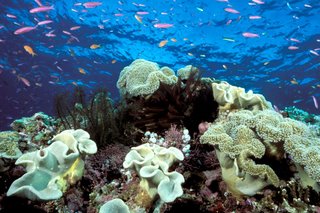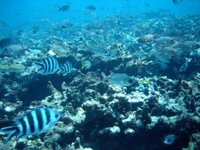Ecotourism
Ecotourism and Conservation, can they be mutually beneficial?
When we talk of ecotourism, I think there are varying levels of concern and commitment to the environment and that varying programs and participants adhere to. Conservation efforts should include providing local peoples with substantial economic benefits that raise their standard of living and allow them to financial liberty to protect the ecological areas that they live off of. Income from tourism can be used to reduce exploitation from outside industries that might degrade the land. Tourism generally has lower negative impact on environments than mining, drilling, logging, etc. Tourism that is truly dedicated toward conservation can have a great educational benefit for the participant who might become interested in or passionate about protecting ecology and biodiversity. There are however, risks in bringing outsiders into an area and setting the natural environment up as a tourist hot spot.
Coral reefs especially have been damaged by tourist use as they become ever more popular diving and snorkeling spots  for new and inexperienced divers. Cruise ships unload hundreds passengers to
for new and inexperienced divers. Cruise ships unload hundreds passengers to  enjoy pristine areas and
enjoy pristine areas and
dying coral reef
healthy coral reef
unfortunately the coral is too sensitive for this mass amount of exposure. Humans often stand on the coral to rest, knock off chunks of it in passing, and in general damage the living organisms that make up the important reef environment.
I think that a more limited number of tourists should be brought into an environment that is made not simply to suit their every comfort in a wild setting, but to bring them into the natural environment to experience nature as local people might. I think that tourism in fragile and important areas for biodiversity is not viable unless a strong educational component is present. Ecotourism should be nature oriented tourism that combines sustainable principles and education with environmentally conscious development and building. It should be stressed that these principals do not allow for the Ritz like services in any region of the world. However, it should demonstrate the natural beauty and efficiency that can be accomplished designing around nature and its processes.

I think that one area of the world inparticular where tourism has been is in Sub-Saharan Africa where wildlife tourism has begun to flourish and become a powerful force in protecting forest, biodiversity, wild species, and whole areas of forest that are threatened by illegal logging and poaching from desperate local peoples. In Kenya alone, 55,000 people are employed by the wildlife tourism industry which gains enough money to protect the land, provide wages, help build local schools , and provide education and training about conservation and sustainability. In this region of the world, colonial legacies of apartheid, racial intolerance, economic devastation , social instability and regional warfare have led to extreme poverty and serious environmental degradation. By making sanctuaries and national protected lands where locals are trained and hired as park rangers and research guides, ecological progress has been made that has contributed to social and economic gains for the local communities. Ex-poachers make excellent rangers and can protect the environment once they are able to feed their families and gain some stability in their lives.
I think that done for the right reasons with the environment and the local people at the heart of the push for tourism, ecotourism can benefit a community and its inhabitants. Sadly, I'm sure there are many operations that run counter to these principals and they need to be evaluated and re-managed or shut down if they are doing greater ecological harm than the area would otherwise have suffered. In this case, there is probably little educational value to the tourist, and in the long run, there will be no economic or social benefit to the local population or the local ecology.

0 Comments:
Post a Comment
<< Home